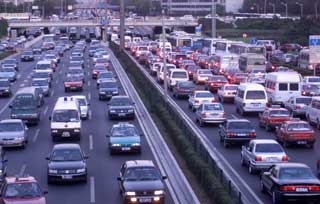|
Researcher: pollution limits sunshine in big cities
(AP)
Updated: 2006-01-29 08:48
China's urban skies have darkened over the past 50 years, possibly due to
haze resulting from a nine-fold increase in fossil fuel emissions, said
researchers from the US Department of Energy, the Associated Press reported.

Traffic congestion
on Beijing's third ring road is shown in this October 22, 2003 file
photo. [newsphoto] |
The
researchers, writing in this month's edition of Geophysical Research Letters,
found that the amount of solar radiation measured at more than 500 stations in
China fell from 1954 to 2001 despite a decrease in cloud cover.
"Normally, more frequent cloud-free days should be sunnier and brighter but
this doesn't happen in our study," said Yun Qian of the energy department's
Pacific Northwest National Laboratory in Washington state.
"The pollution (that) resulted from human activity may have created a haze
which absorbs and deflects the sun's rays," Qian, the study's lead author, was
quoted by the Associated Press as saying.
Air pollution is widespread in China. Antiquated factories billow smoke, many
residents still use coal to heat their houses, and a sharp increase in car
ownership has bathed the motorways in exhaust fumes.
Using data from more than 500 weather stations in China, American researchers
found the amount of sunlight hitting the ground has fallen by 3.7 watts per
square yard in each of the last five decades amid a nine-fold increase in fossil
fuel emissions.
The cloud cover data used in the study was obtained from the China
Meteorological Administration through a bilateral agreement with the U.S.
Department of Energy on global and regional climate change, the researchers
said.
Herbert G. Fabian, who studies urban pollution and transportation issues for
the Asian Development Bank, said the study's conclusion "makes sense" but that
more information is needed.
"There really is (an) air pollution problem and a haze problem in China
because (of) dust storms and pollution," said Fabian. "But we can't say
conclusively that the reduction in sunlight is due to haze."
The study also said haze appears to have masked the impact of global warming
by reflecting sunlight back into space and cooling the Earth's surface.
"The haze may have masked the effects of global warming across large parts of
China, particularly in the central and eastern regions, where daily high
temperatures have actually been decreasing," Qian said. "This may seem like good
news, but any success China has in curbing emissions will accelerate the effects
of global warming in those areas when the cooling mask is
lifted."
|